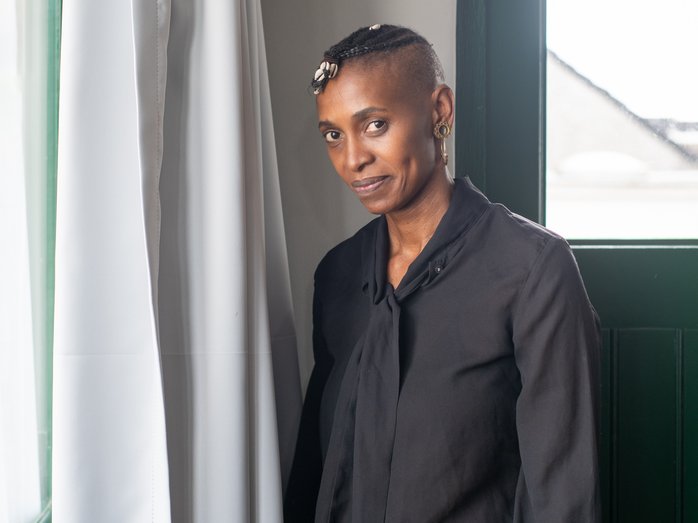Mamela Nyamza
Portrait
Mamela Nyamza first made “Hatched” in 2007 as a solo work. Her then young son, Amkele Mandla, joined her on stage with crayons and paper, busy colouring while his mother performed with washing line and pegs, on pointe. A lyrical but direct statement speaking both to the ostensive content of the piece, and to the demanding intermingling of the personal and professional for a young black woman in South Africa. “I come from a background of ballet that does not accept me as a black dancer. In the discipline of dance itself, dancers are always put down, and I have fought that throughout my career,” she says in an interview with Alx Phillips on lookingfordrama.com.
Mamela’s lifelong negotiation of her performing body and her professional self has been driven by the fight for means, recognition and dignity. In Apartheid South Africa where black people were relegated to the status of ‘third class’ citizens, structural racism and daily racist injustices made her pursuit of excellence in the discipline of dance an arduous task. These obstacles have existed not just at the level of means, access and networks, but also in the cultural-psychological underpinnings of ballet and of dance more generally as an institutionalised cultural form. Ballet training to young bodies draws reference in form and line from canonical white bodies: the perfection of a tightly tied hair bun where straight hair lies flat on the scalp and twists into a small globe on the head. The body structure a faint impression of lean taut muscle.
In South Africa, Mamela is one of our revered, contemporary greats, reshaping dance to fit the shapes and musculatures and scarification of the black South African body and experience. She has lived through expressions of hatred against women and against queer bodies, both in her life and in her family. She has raised her voice against injustice, has taught ballet to new generations, created dance programming locally, and toured internationally.
In 2018, she revisited “Hatched”, bringing with her the same red, the same physicality and arresting presence. Amkele, at this point 18 years old, joins her on stage at a later moment in the work. A young man now, he faces the audience and raps as his mother steps back, but not away. In reforming the solo work as an ensemble piece, Mamela extends the idea of progeny explored in the first iteration of the work, from the personal into the professional realm.
At the premiere of “Hatched Ensemble” in Makhanda, South Africa in 2023, the tension hung like taut fog. Many pegs on layers of tulle, shuffling and shifting and clicking with each other, antagonising the classic piano. Bodies slide across stage and gender. Grit and poise. As the dancers unfurled, the audience whistled, here and there – by the end, they were out of their chairs, dancing. At the run at the Market Theatre in Johannesburg, folks were even singing with the music. Bodies respond to each other, giving sound to the release and their pleasure. They hold the dancers and the dancers hold the room.
In the podcast “Listening Bodies”, Mamela told Sarah Israel and Rucera Seethal about the dancers: “I told them, you don’t have to make them like or love what you are doing. Don’t overdo what you are doing, calm down, don’t over perform it, don’t perform for me. You know. Be yourself. When you go inside yourself, anything can happen.”
Rucera Seethal
